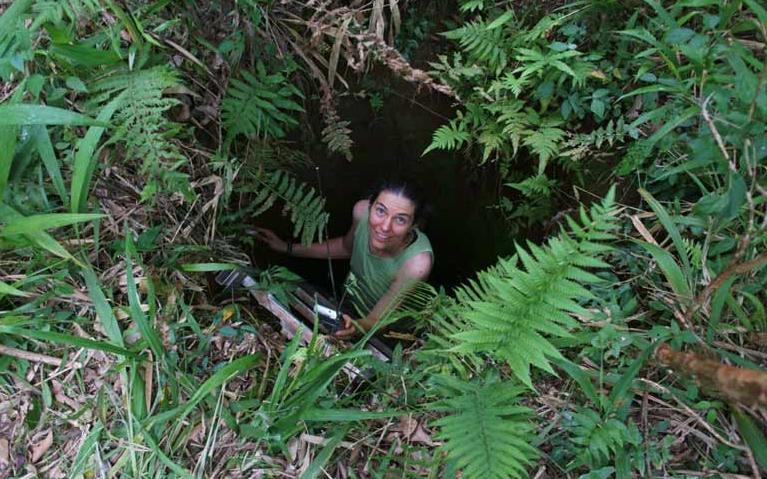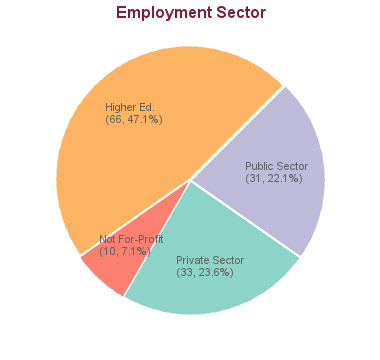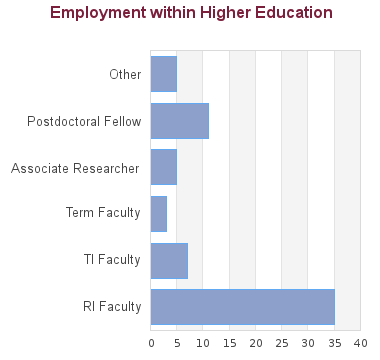
Kristina Cockle
Job Title
Research Scientist
Employer
CONICET

Review details about the recently announced changes to study and work permits that apply to master’s and doctoral degree students. Read more
Forestry graduate students learn from a dynamic and diverse group of researchers who educate and communicate how forests and the products that are created from them contribute to the well-being of all living things. The health and sustainability of forests and the people who depend on them underlies everything we do. We are among the best institutions globally in forest-related education and research and are also unique in the breadth of expertise we possess, which allows us to integrate new knowledge across many disciplines.
PhD in Forestry students can be found all over the world; they are important ambassadors for UBC Forestry and demonstrate just how diverse and international in scope the research is that is undertaken in our Faculty. We have approximately 130 doctoral students in any given year, which is about 40% of our total Forestry graduate student population. In addition to being part of the Faculty of Forestry, PhD students are also considered members of one of our three Faculty departments, based on their supervisor's affiliation.
The Faculty of Forestry offers excellent courses and cutting edge research across a spectrum of disciplines related to forestry, and opportunities for interdisciplinary learning. Graduate students work with leading scientists in state-of-the-art facilities within the Forest Sciences Centre and at any of two research forests.
We are one of the largest graduate units on campus, with over 300 students enrolled in our 7 degree programs. We attract students from around the world, with over 40 countries represented in our community. Given the global nature of modern forestry, the experience our students gain by working with colleagues from around the world is a subtle but effective means of creating the global citizens that UBC aspires to produce.
The major requirement for the PhD in Forestry is completion of a research dissertation which meets the requirements of the Faculty of Graduate & Post-doctoral Studies. Advancement to Candidacy must be achieved within 24 months of the start of studies, the requirements of which include a comprehensive examination. Course work is not required for the Forestry PhD, although many doctoral students do complete courses (either for credit or audit) as recommended by their supervisory committee.
The Faculty of Graduate and Postdoctoral Studies establishes the minimum admission requirements common to all applicants, usually a minimum overall average in the B+ range (76% at UBC). The graduate program that you are applying to may have additional requirements. Please review the specific requirements for applicants with credentials from institutions in:
Each program may set higher academic minimum requirements. Please review the program website carefully to understand the program requirements. Meeting the minimum requirements does not guarantee admission as it is a competitive process.
Applicants from a university outside Canada in which English is not the primary language of instruction must provide results of an English language proficiency examination as part of their application. Tests must have been taken within the last 24 months at the time of submission of your application.
Minimum requirements for the two most common English language proficiency tests to apply to this program are listed below:
Overall score requirement: 100
Reading
23
Writing
24
Speaking
22
Listening
23
Overall score requirement: 7.0
Reading
6.5
Writing
6.5
Speaking
6.5
Listening
6.5
Some programs require additional test scores such as the Graduate Record Examination (GRE) or the Graduate Management Test (GMAT). The requirements for this program are:
The GRE is not required.
Students admitted to the Ph.D. degree program normally possess a master's degree in Forestry or a related area, with clear evidence of research ability or potential. Transfer from the master's to the Ph.D. program is permitted under Faculty of Graduate and Postdoctoral Studies regulations. Exceptional students may be admitted directly to the Ph.D. program from the bachelor's level.
Deadline to submit online application. No changes can be made to the application after submission.
Transcript DeadlineDeadline to upload scans of official transcripts through the applicant portal in support of a submitted application. Information for accessing the applicant portal will be provided after submitting an online application for admission.
Referee DeadlineDeadline for the referees identified in the application for admission to submit references. See Letters of Reference for more information.
All applicants have to submit transcripts from all past post-secondary study. Document submission requirements depend on whether your institution of study is within Canada or outside of Canada.
A minimum of three references are required for application to graduate programs at UBC. References should be requested from individuals who are prepared to provide a report on your academic ability and qualifications.
Many programs require a statement of interest, sometimes called a "statement of intent", "description of research interests" or something similar.
Students in research-based programs usually require a faculty member to function as their thesis supervisor. Please follow the instructions provided by each program whether applicants should contact faculty members.
Securing the interest of a prospective faculty supervisor is a vital step in the PhD, MSc and MASc application process, and interest must be confirmed before you submit the online application. Using the prospective supervisor list at , carefully review faculty members whom you consider to be the best match with your research interests. Make a short-list of prospective supervisors and contact them to see if they are accepting new students. Remember that faculty members receive many inquiries, so generic e-mails may not receive a response. Make your correspondence stand out: tell potential supervisors about your background and interests and how this relates to their research area. As part of your conversation with a prospective supervisor, it is important to discuss funding. UBC Forestry requires that supervisors have a minimum funding package planned for the student prior to an Offer of Admission being issued. Your online application should only be submitted after a prospective supervisor has confirmed to you that they are interested in reviewing your application.
Permanent Residents of Canada must provide a clear photocopy of both sides of the Permanent Resident card.
All applicants must complete an online application form and pay the application fee to be considered for admission to UBC.
| Fees | Canadian Citizen / Permanent Resident / Refugee / Diplomat | International |
|---|---|---|
| Application Fee | $116.25 | $168.25 |
| Tuition * | ||
| Installments per year | 3 | 3 |
| Tuition per installment | $1,875.34 | $3,294.66 |
| Tuition per year (plus annual increase, usually 2%-5%) | $5,626.02 | $9,883.98 |
| Int. Tuition Award (ITA) per year (if eligible) | $3,200.00 (-) | |
| Other Fees and Costs | ||
| Student Fees (yearly) | $1,144.10 (approx.) | |
| Costs of living | Estimate your costs of living with our interactive tool in order to start developing a financial plan for your graduate studies. | |
Applicants to UBC have access to a variety of funding options, including merit-based (i.e. based on your academic performance) and need-based (i.e. based on your financial situation) opportunities.
From September 2024 all full-time students in UBC-Vancouver PhD programs will be provided with a funding package of at least $24,000 for each of the first four years of their PhD. The funding package may consist of any combination of internal or external awards, teaching-related work, research assistantships, and graduate academic assistantships. Please note that many graduate programs provide funding packages that are substantially greater than $24,000 per year. Please check with your prospective graduate program for specific details of the funding provided to its PhD students.
This results in a net balance (any funding provided to the student minus tuition and fees) mean of $33,983 and median of $34,757.
All applicants are encouraged to review the awards listing to identify potential opportunities to fund their graduate education. The database lists merit-based scholarships and awards and allows for filtering by various criteria, such as domestic vs. international or degree level.
Many professors are able to provide Research Assistantships (GRA) from their research grants to support full-time graduate students studying under their supervision. The duties constitute part of the student's graduate degree requirements. A Graduate Research Assistantship is considered a form of fellowship for a period of graduate study and is therefore not covered by a collective agreement. Stipends vary widely, and are dependent on the field of study and the type of research grant from which the assistantship is being funded.
Graduate programs may have Teaching Assistantships available for registered full-time graduate students. Full teaching assistantships involve 12 hours work per week in preparation, lecturing, or laboratory instruction although many graduate programs offer partial TA appointments at less than 12 hours per week. Teaching assistantship rates are set by collective bargaining between the University and the Teaching Assistants' Union.
Academic Assistantships are employment opportunities to perform work that is relevant to the university or to an individual faculty member, but not to support the student’s graduate research and thesis. Wages are considered regular earnings and when paid monthly, include vacation pay.
Canadian and US applicants may qualify for governmental loans to finance their studies. Please review eligibility and types of loans.
All students may be able to access private sector or bank loans.
Many foreign governments provide support to their citizens in pursuing education abroad. International applicants should check the various governmental resources in their home country, such as the Department of Education, for available scholarships.
The possibility to pursue work to supplement income may depend on the demands the program has on students. It should be carefully weighed if work leads to prolonged program durations or whether work placements can be meaningfully embedded into a program.
International students enrolled as full-time students with a valid study permit can work on campus for unlimited hours and work off-campus for no more than 24 hours a week during academic sessions.
A good starting point to explore student jobs is the UBC Work Learn program or a Co-Op placement.
Students with taxable income in Canada may be able to claim federal or provincial tax credits.
Canadian residents with RRSP accounts may be able to use the Lifelong Learning Plan (LLP) which allows students to withdraw amounts from their registered retirement savings plan (RRSPs) to finance full-time training or education for themselves or their partner.
Please review Filing taxes in Canada on the student services website for more information.
Applicants have access to the cost estimator to develop a financial plan that takes into account various income sources and expenses.
154 students graduated between 2005 and 2013: 2 are in non-salaried situations; for 12 we have no data (based on research conducted between Feb-May 2016). For the remaining 140 graduates:


These statistics show data for the Doctor of Philosophy in Forestry (PhD). Data are separated for each degree program combination. You may view data for other degree options in the respective program profile.
| 2023 | 2022 | 2021 | 2020 | 2019 | |
|---|---|---|---|---|---|
| Applications | 55 | 59 | 44 | 63 | 37 |
| Offers | 31 | 33 | 26 | 33 | 19 |
| New Registrations | 24 | 27 | 24 | 29 | 16 |
| Total Enrolment | 157 | 150 | 142 | 132 | 121 |
Students in research-based programs usually require a faculty member to function as their thesis supervisor. Please follow the instructions provided by each program whether applicants should contact faculty members.
Securing the interest of a prospective faculty supervisor is a vital step in the PhD, MSc and MASc application process, and interest must be confirmed before you submit the online application. Using the prospective supervisor list at , carefully review faculty members whom you consider to be the best match with your research interests. Make a short-list of prospective supervisors and contact them to see if they are accepting new students. Remember that faculty members receive many inquiries, so generic e-mails may not receive a response. Make your correspondence stand out: tell potential supervisors about your background and interests and how this relates to their research area. As part of your conversation with a prospective supervisor, it is important to discuss funding. UBC Forestry requires that supervisors have a minimum funding package planned for the student prior to an Offer of Admission being issued. Your online application should only be submitted after a prospective supervisor has confirmed to you that they are interested in reviewing your application.
These videos contain some general advice from faculty across UBC on finding and reaching out to a supervisor. They are not program specific.
| Year | Citation |
|---|---|
| 2017 | Trees are rooted to the spot and evolutionarily adapted to local climates. Dr. MacLachlan found that tree breeding programs increase tree growth and maintain climatic adaptation, without compromising provincial reforestation policies designed to mitigate the effects of climate change, and they help to maintain future timber supplies in western Canada. |
| 2017 | Dr. Tomaselli explored different mental models and attitudes about economic growth and the environment among Canadians. A majority of the sampled population supports moving into an economic model based on lower levels of consumption. This research supports the development of political discourses less focused on economic growth as a main goal. |
| 2017 | Dr. Rickbeil assessed how changing environmental conditions are affecting barren ground caribou habitat use and movement in the Canadian Arctic. |
| 2017 | Dr. Zhang evaluated the seismic performance of a novel mass timber-steel hybrid high-rise system. This research serves as a precursor for developing design guidelines for tall wood-hybrid building systems in seismic regions, and providing appropriate information to increase the acceptance and use of this mass-timber steel hybrid high-rise structural concept. |
| 2017 | Wood and plants release inhibitors that prevent enzymes from breaking them down into valuable chemicals. Dr. Zhai developed a feasible way to eliminate these inhibitors and boost the function of enzymes. This work showed how a likely industrial bioconversion process could be enhanced. |
| 2017 | Dr. Erickson researched the effects of warming and human activity on forests in Alberta. He found that human activity changed forest fires in a way that may slow tree migrations while reducing understory light. His work was the first to combine dynamic vegetation modeling and machine learning, which may broadly benefit earth systems modeling. |
| 2017 | The extent to which tropical forests change after the harvesting of trees is not clear. Dr. Addo-Danso's research showed that the forest structure, biomass and productivity in a tropical forest in Ghana recovered to pre-harvesting levels 54 years after the trees were cut. His findings have important implications for the management of tropical forests. |
| 2017 | Dr. Jaung studied certification of forest ecosystem services. His findings show the opportunities and challenges of applying certification to ecosystem services management. His work contributes to analyzing comprehensive management of forest resources. |
| 2017 | Dr. Dou studied the use of enzymes to facilitate converting paper pulp into dissolving pulp used to make textiles. She identified optimal conditions for enzymes and increased their potential in dissolving pulp. Her findings have important implications on the production of regenerated cellulose used in man-made fibers such as Tencel. |
| 2017 | Dr. Sam-Brew evaluated non-wood residues for particleboard manufacture. Her work demonstrates that low density boards of greater mechanical performance to wood can be produced from flax and hemp residues. This translates to easy handling and processing, along with cost savings on transportation of the final product for panel manufacturers. |
Forestry offers advanced study in natural and social science, management, and economic aspects of forestry and wood science, in an interdisciplinary setting.
Departments/Programs may update graduate degree program details through the Faculty & Staff portal. To update contact details for application inquiries, please use this form.

Find out how Vancouver enhances your graduate student experience—from the beautiful mountains and city landscapes, to the arts and culture scene, we have it all. Study-life balance at its best!